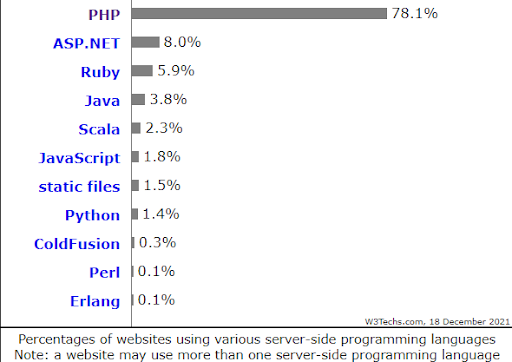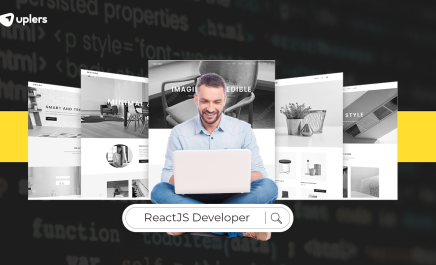Top 8 PHP Development Tools You Can Adopt in 2022
- Kevin Oskow
- January 27, 2022
- 5 Minute Read

PHP powers 78.2% of websites worldwide. Thus, for every 10 websites you visit, 8 websites run on PHP.

Some of the names among these websites include Facebook, MailChimp, and Tumblr.
Okay, now you too want a website built on PHP. However, before you hire a dedicated PHP developer, make sure the developer knows how to use these eight PHP development tools:
- PHPStorm
- Zend Studio
- PHP Debug Bar
- CodeLobster
- AWS Cloud9
- Netbeans
- Aptana Studio
- Eclipse
1. PHPStorm
If you’re developing projects using several third-party applications and using large codebases, PHPStorm is the best choice for you. The tool offers the code editing environment.
The Java-based lightweight IDE supports PHP coding frameworks including Laravel, Yii, and Zend. Furthermore, the PHP development tool supports popular Content Management Systems such as WordPress and Drupal.
Pros
- The background code indexing connects the code together and catches common errors.
- The in-built terminal allows you to run code management tools and pre-processing directly from the editor.
- Cross-platform support allows running the software on any operating platform.
Cons
- Operates slowly in machines with lower than 16 GB RAM.
- A rigid project-based structure prevents from taking throwaway notes or performing quick edits.
2. Zend Studio
Google. Microsoft. StrikeIron. These are some of the giants that use Zend Studio.
The PHP development tool can deploy PHP applications on any server and offers stunning speed. Zend Studio is compatible with PHP 7.
Pros
- Offers fast coding along with an intelligent code editor.
- Integrates with Zend Debugger, X-ray, and Xdebug.
- Offers PHP profiling and debugging both independently and with the Zend Server.
- Supports all the leading programming languages including PHP, JavaScript, C, and C++.
- Offers interoperability with GitHub, Git, SVN, and CVS.
Cons
- The PHP development tool has a steep learning curve and huge documentation.
- The plug-ins are expensive.
3. PHP Debug Bar

PHP Debug Bar allows you to display profiling data from multiple web applications. The development tool comes with two parts — the main DebugBar and data collectors and the render.
The development tool works on the data collector architecture. Furthermore, the tool allows you to save your requests and reopen them.
Pros
- Inspects monitor networks and CSS elements.
- You can create customized collectors and view the collectors in the bar.
- Supports leading programming languages including Java, PHP, and Ruby.
- Offers an in-built data collector for standard PHP highlights.
- Can handle AJAX requests with ease.
- Offers detailed documentation.
Cons
- Incompatible with PHP versions lower than 5.5.
4. CodeLobster
If you’re searching for an IDE to modernize and streamline the development process, CodeLobster is the perfect choice for you. The PHP development tool supports all the leading PHP frameworks including Laravel, EmberJS, and CodeIgniter.
The developers offer CodeLobster at a price of $39.95 per feature.
Pros
- In-built PHP debugger validates the code locally.
- Offers an auto-complete feature for PHP arguments, characters, tags, functions, and attributes. Thus, you won’t need to remember anything during coding.
- Autocompletes DOM elements, keywords, and their respective properties.
- Supports all leading platforms including Windows, Mac OS, and Linux. Furthermore, among these top eight PHP development tools, CodeLobster supports all the major programming languages such as JavaScript, CSS, and HTML as well.
Cons
- The user interface is outdated.
- Doesn’t showcase larger data items in their entirety.
Also read: Identifying the Best Web Development Framework for Your Business Needs
5. AWS Cloud9
AWS Cloud9 offers a pre-configured environment to allow developers to start coding right away. Furthermore, if you want to build a server less application and write, debug, and run code in a browser, AWS Cloud9 is the perfect tool for you.
The web services unit of Amazon.com has created the Integrated Development Environment (IDE). The app comes equipped with an in-built code editor, debugger, and terminal.
Pros
- Offers a real-time language analysis, image editor, and debugger.
- Offers real-time input tracking and a shareable development environment.
- The collaborative coding feature allows developers to code along with their colleagues.
- Offers supported tooling for over 40 programming languages including PHP, JavaScript, Python, Node.js, and C++.
- Offers file revision history to help you see all the changes you made.
Cons
- Doesn’t support language debugging other than PHP.
- Doesn’t sync with file storage services such as Google Drive and Dropbox.
6. Netbeans
A free, lightweight, open-source, and cross-platform IDE for PHP applications. That’s Netbeans for you. The PHP development tool supports several languages other than English such as Russian, Japanese, Brazilian, Chinese, and Portuguese.
The tool was originally built for Java development.
Pros
- Offers a Netbeans profiler, intelligent code completion, and a visual debugger.
- Offers sturdy project management, code templates, efficient refactoring, and getter setter generation.
- Compatible with all the leading PHP frameworks such as WordPress, Zend, Symfony 2, Smarty, CakePHP, and FuelPHP.
- Excellent for testing and debugging code.
- Allows you to run server-based applications with ease.
Cons
- Takes up lots of space. Furthermore, the IDE runs slow on computers with i3 processors.
- Compilation and execution performance is slower when compared to other IDEs.
7. Aptana Studio
Aptana Studio is the perfect choice for you if you want to build dynamic web applications. The PHP development tool integrates with several server-side and client-side applications that use technologies such as PHP, HTML5, Python, and many others.
The tool upholds the command-line interface and debuggers and makes them more advanced for PHP website development.
Pros
- Offers IDE, FTP, and SFTP customization. Furthermore, code assistant allows you to write programs in different languages including JavaScript and CSS.
- Integrates with JavaScript and AJAX popular libraries.
- Supports information availability from all leading internet browsers such as Firefox, Opera, and Safari.
- Allows you to build and test web applications in one environment.
- Offers a deployment wizard, an integrated debugger, an integrated terminal, and code help.
Cons
- Aptana Studio among all he PHP development tools is heavy and can get stuck when several apps are working simultaneously.
8. Eclipse
If you’re searching for a tool that offers a wide range of plugins to make coding easier, Eclipse is your best shot. Developed by IBM, the PHP development tool is customizable. Furthermore, the tool supports both GUI and non-GUI applications.
The tool offers both the PHP and Java environment as standards.
Pros
- Offers code templates, code assistance, code restructuring, code formatting and navigation, and syntax highlighting. The feature helps you to write better code with ease.
- Supports all the leading programming languages such as JavaScript, COBOL, Ruby, C, C++, and Python.
- Auto-completion which helps you save a lot of time.
- A wide range of plugins including code formatter plugins and unit testing plugins.
- Offers multiple language support too.
- The user interface is simple and easy to use.
- Offers detailed documentation and an active community. Thus, any time you have an issue, there’s an answer.
Cons
- Doesn’t offer an in-built code replacement feature.
- Intellisense feature can hang at times.
A PHP developer’s skills should match their salary
A PHP developer salary ranges from $29,040 to $91,508 a year on average. If you’re going to pay someone that much, you must make sure they have the necessary skills and knowledge.
In this article, you have learnt about the top eight PHP development tools a developer must have knowledge of:
- PHPStorm
- Zend Studio
- PHP Debug Bar
- CodeLobster
- AWS Cloud9
- Netbeans
- Aptana Studio
- Eclipse
The knowledge will help you make informed decisions.


Thank you for submitting the details!
We will keep your information safe. Feel free to contact us with any questions at hello@uplers.com
Please check your email for next steps shared by Robert.















